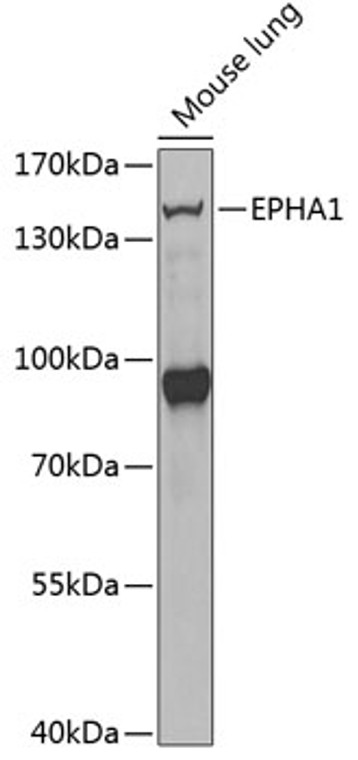| Host: |
Rabbit |
| Applications: |
WB |
| Reactivity: |
Human/Mouse |
| Note: |
STRICTLY FOR FURTHER SCIENTIFIC RESEARCH USE ONLY (RUO). MUST NOT TO BE USED IN DIAGNOSTIC OR THERAPEUTIC APPLICATIONS. |
| Short Description: |
Rabbit polyclonal antibody anti-EPHA1 (1-230) is suitable for use in Western Blot research applications. |
| Clonality: |
Polyclonal |
| Conjugation: |
Unconjugated |
| Isotype: |
IgG |
| Formulation: |
PBS with 0.02% Sodium Azide, 50% Glycerol, pH7.3. |
| Purification: |
Affinity purification |
| Dilution Range: |
WB 1:500-1:2000 |
| Storage Instruction: |
Store at-20°C for up to 1 year from the date of receipt, and avoid repeat freeze-thaw cycles. |
| Gene Symbol: |
EPHA1 |
| Gene ID: |
2041 |
| Uniprot ID: |
EPHA1_HUMAN |
| Immunogen Region: |
1-230 |
| Immunogen: |
Recombinant fusion protein containing a sequence corresponding to amino acids 1-230 of human EPHA1 (NP_005223.4). |
| Immunogen Sequence: |
MERRWPLGLGLVLLLCAPLP PGARAKEVTLMDTSKAQGEL GWLLDPPKDGWSEQQQILNG TPLYMYQDCPMQGRRDTDHW LRSNWIYRGEEASRVHVELQ FTVRDCKSFPGGAGPLGCKE TFNLLYMESDQDVGIQLRRP LFQKVTTVAADQSFTIRDLV SGSVKLNVERCSLGRLTRRG LYLAFHNPGACVALVSVRVF YQRCPETLNGLAQFPDTLPG PAGLVEVAGT |
| Tissue Specificity | Overexpressed in several carcinomas. |
| Post Translational Modifications | Phosphorylated. Autophosphorylation is stimulated by its ligand EFNA1. Ubiquitinated. |
| Function | Receptor tyrosine kinase which binds promiscuously membrane-bound ephrin-A family ligands residing on adjacent cells, leading to contact-dependent bidirectional signaling into neighboring cells. The signaling pathway downstream of the receptor is referred to as forward signaling while the signaling pathway downstream of the ephrin ligand is referred to as reverse signaling. Binds with a low affinity EFNA3 and EFNA4 and with a high affinity to EFNA1 which most probably constitutes its cognate/functional ligand. Upon activation by EFNA1 induces cell attachment to the extracellular matrix inhibiting cell spreading and motility through regulation of ILK and downstream RHOA and RAC. Also plays a role in angiogenesis and regulates cell proliferation. May play a role in apoptosis. |
| Protein Name | Ephrin Type-A Receptor 1Hepha1Eph Tyrosine KinaseEph Tyrosine Kinase 1Erythropoietin-Producing Hepatoma ReceptorTyrosine-Protein Kinase Receptor Eph |
| Database Links | Reactome: R-HSA-2682334Reactome: R-HSA-2892247Reactome: R-HSA-3928663Reactome: R-HSA-3928665 |
| Cellular Localisation | Cell MembraneSingle-Pass Type I Membrane Protein |
| Alternative Antibody Names | Anti-Ephrin Type-A Receptor 1 antibodyAnti-Hepha1 antibodyAnti-Eph Tyrosine Kinase antibodyAnti-Eph Tyrosine Kinase 1 antibodyAnti-Erythropoietin-Producing Hepatoma Receptor antibodyAnti-Tyrosine-Protein Kinase Receptor Eph antibodyAnti-EPHA1 antibodyAnti-EPH antibodyAnti-EPHT antibodyAnti-EPHT1 antibody |
Information sourced from Uniprot.org
12 months for antibodies. 6 months for ELISA Kits. Please see website T&Cs for further guidance







